Blog about successful marketing strategies in russia
Attract Russian Patients: Develop a Winning Medical Tourism Strategy


DIGITAL MARKETING
Share this Post
Despite the challenges, the medical tourism industry is experiencing growth on a global scale. The global market for this industry reached $84.92 billion in 2024, and forecasts indicate that it will exceed $239.37 billion by 2029. Research indicates that the global centers for medical tourism are located in India, Barbados, Singapore, Japan, Thailand, and South Korea. In general, the Asia-Pacific region is predicted to grow at an average annual rate of more than 10%.
What factors are contributing to this trend?
-
Technological advances and artificial intelligence;
-
Aging population and increasing life expectancy;
-
A surge in CHD (coronary heart disease) cases;
-
Diagnosis of higher cardiovascular disease risks in people with diabetes;
-
Increase in the number of patients with chronic diseases;
-
Interest in aesthetic medicine, plastic surgery, and health tourism.
The demand for medical tourism in Russia is also justified. Each year, more and more Russian residents are discovering the benefits of commercial medicine and realizing that it is not only available in their city or the capital. Many foreign clinics offer access to the latest medical technologies and innovative treatment methods that may not be available or less developed in Russia. Some patients simply believe that the quality of medical services and professionalism of doctors in foreign clinics is higher than in Russian clinics. Moreover, numerous medical facilities abroad specialize in specific treatment modalities, enabling them to amass substantial expertise in these domains and attract patients with a particular profile.
In some cases, particularly when complex operations or specialized procedures are required, Russian patients may face lengthy wait times at state-run medical facilities. Foreign healthcare providers, however, are often able to offer a higher level of service and a more personalized approach.
Top destinations for outbound medical tourism among Russians
In 2022, the countries with the highest number of requests for medical treatment abroad from Russian nationals were Israel, Belarus, Germany, and China. Some studies include the UAE, Turkey, and South Korea in this list. Furthermore, price was not a determining factor. A majority (52%) of respondents indicated a willingness to pay for expensive treatments, while a significant proportion (37%) prioritized affordability. It should be noted that this primarily concerns a highly solvent audience.
The majority of medical service consumers (74%) traveled visa-free, with 59% planning treatment in countries with average transport accessibility. Only 6% of the country's residents were willing to travel long distances. One of the additional advantages of clinics was the ability to speak Russian, which was a deciding factor for 83% of respondents.
By 2024, the geography of medical tourism in Russia had shifted. Belarus, Kazakhstan, Thailand, and Israel were the most popular countries. The most sought-after treatments were sanatorium care, obstetrics, dentistry, and plastic surgery.
Recent studies have indicated that women are the demographic most interested in pursuing treatment options abroad. The majority of these individuals are aged 55 and above. However, in other countries, the age at which people begin to consider treatment abroad is typically between 25 and 34.
From these findings, it is clear that medical tourism is a significant and growing trend among Russians. Despite global political and economic shifts, the demand for medical tourism services is on the rise. However, the approach to advertising such specific services should be appropriate and in line with industry standards.
Features of outbound medical tourism promotion in Russia
The algorithm for working on a campaign is essentially the same as for other products, but it is important to consider the global economics of the industry. For instance, when defining the target audience, you need to understand their income level and the amount they are willing to spend on medical services. It is important to ascertain whether these individuals are willing to wait for treatment or if they require urgent care. Do they require a specific clinic, country, or simply the ability to travel abroad for treatment? Furthermore, given the intrinsic link between health services and health and safety, it is of paramount importance to ensure transparency of information and to cultivate trust with potential clients.
There are three fundamental views of the medical tourism consumer. The approach to advertising will depend on what motivates the demand:
-
If people want to be treated in a particular country and have already decided on it, you need to frame the interaction so that the future patient ultimately chooses your clinic over a competitor's clinic.
-
If the audience is focused on solving their problem but has not yet decided in which country they can find the right care, it is better to work on this issue first. Why do consumers need to be treated in the country where your clinic is located and not in some other? There should already be more arguments, and the advertising campaign will require a longer time.
-
If people have not yet thought about seeking treatment in other countries, you need to start there. The "coldest" audience, which is not yet focused on traveling abroad to solve their health problems, should be gradually and persistently explained why they can receive quality care, first of all, abroad, and secondly, in a particular country and a particular clinic.
Main channels of promotion
Website
Medical clinic and agency websites should be professional and informative. It is your passport, business card, and main source of information about your organization. In addition to the fact that it should quickly, clearly, and attractively inform users about the services you promote, the resource should also be simple and logical to use. So that a person can get the maximum amount of information they need with the minimum number of actions.
What you need at your fingertips:
-
Comprehensive procedure descriptions with pricing.
-
Real patient testimonials and treatment success stories.
-
Contact and consultation forms.
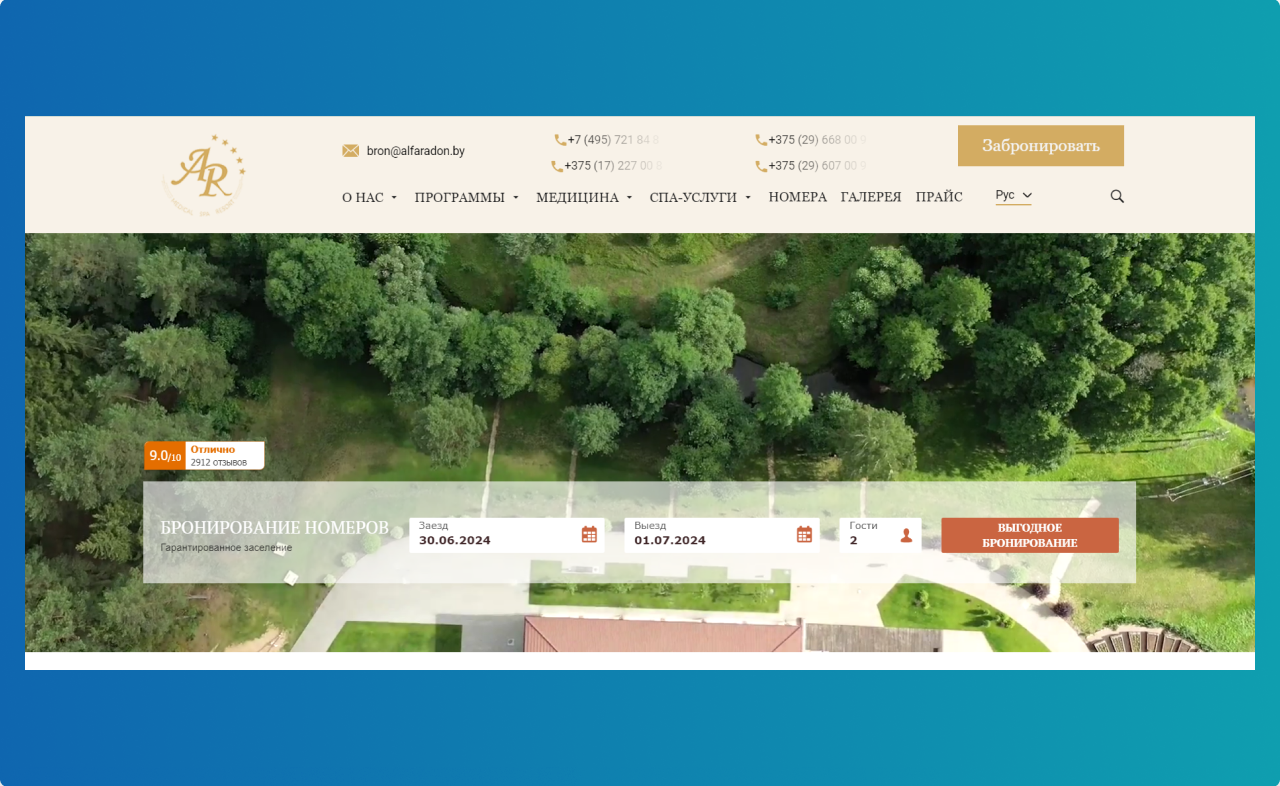
Alpha Radon Sanatorium website in Belarus
SEO
Search engine optimization remains one of the most effective ways to attract medical tourists. After all, a person is programmed to look for quick solutions, and quick in this case will be the search for answers on the Internet. Therefore, thorough work with SEO will maximize the coverage of the target audience, get to the top of their queries and increase the chances of attracting new customers.
Key actions:
-
Regularly create high-quality articles describing procedures, patient testimonials, and success stories.
-
Optimize the site in multiple languages to attract an international audience.
-
Ensure the site loads quickly (including mobile versions), and develop a simple and user-friendly interface.
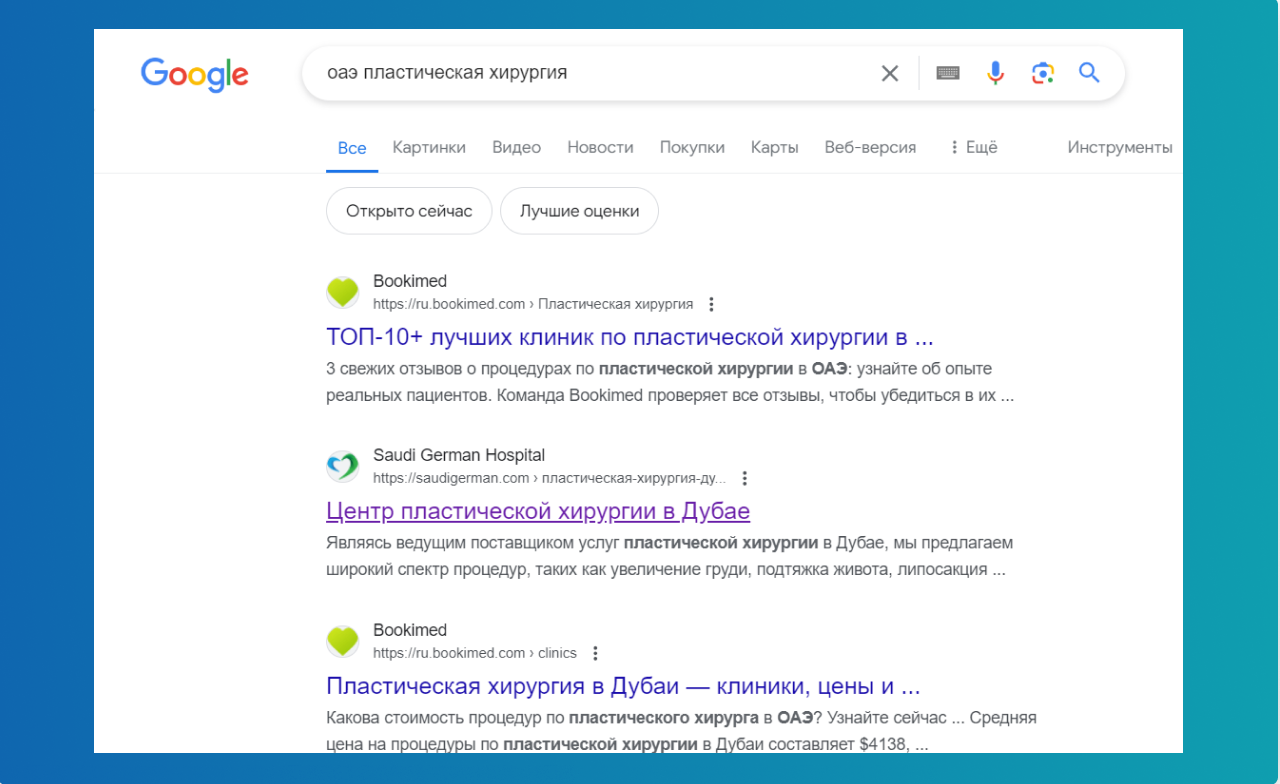
Saudi German Hospital website at the top of the Google search results
Paid ads
Paid ads also remain one of the leaders in the list of the most effective ways to promote medical tourism in Russia. Yandex has become the main platform for this due to restrictions on the use of Google. Its main advertising tool, Yandex.Direct, allows to display of advertising to the target audience at the moment when they are actively searching for information related to medical services and tourism, selecting target segments by geographical location, age, gender, interests, and other parameters.
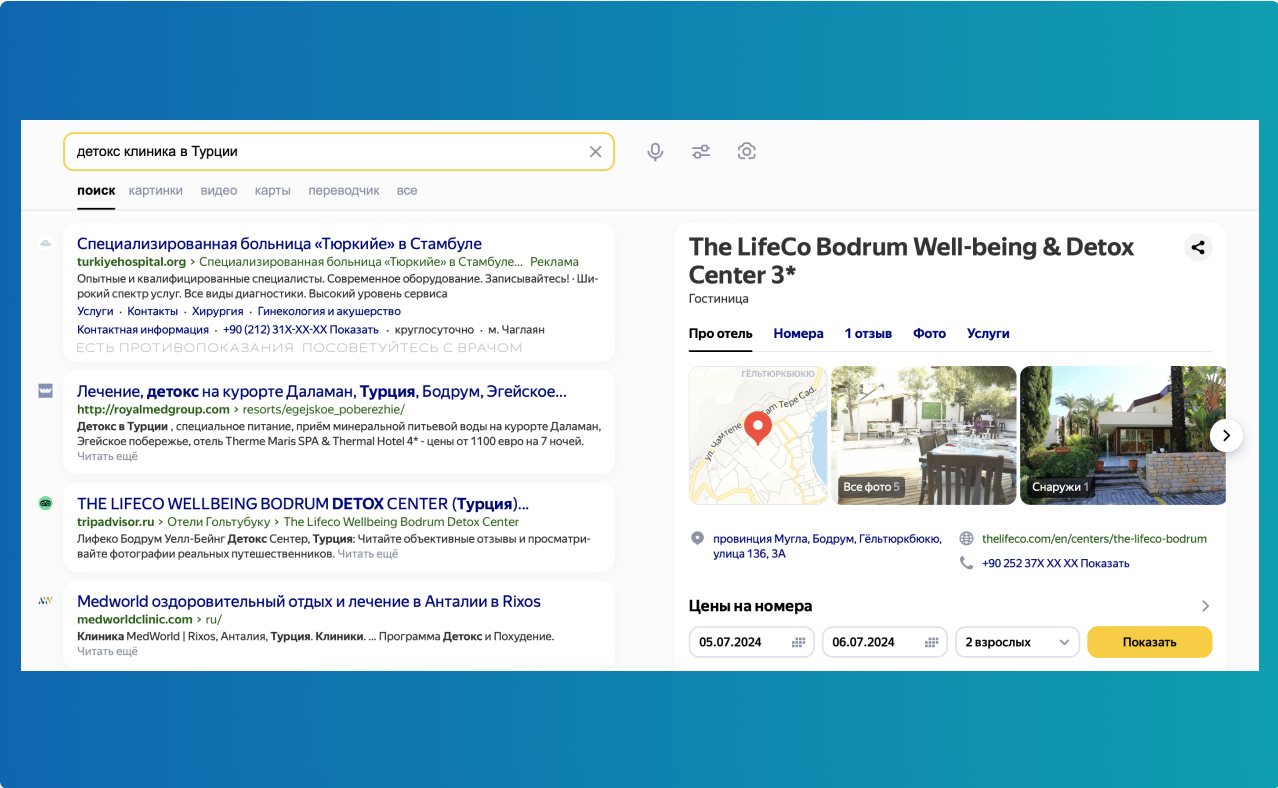
Advertisement of a detox center in Turkey in Yandex search results
What to consider:
-
Keywords and phrases. For medical tourism, these can be queries related to specific procedures, clinic services, prices, patient reviews, etc. It is important to use relevant and popular queries to ensure that your ads get in front of interested users.
-
Maximize campaign detail. You can use analytics and open data tools, experiment with creative, and test different hypotheses.
-
Geotargeting. By setting up ads for users from specific cities or regions, you can attract patients from areas with higher demand for medical services and a more affluent audience.
-
Retargeting. The Yandex Advertising System offers the advantage of allowing you to retarget users who have already demonstrated interest in medical services but have not yet completed the desired action.
The Yandex Advertising Network enables advertisers to address fundamental tasks at each stage of the customer journey. This is advantageous as the service has a vast coverage, ensuring that advertising campaigns reach potential customers in one way or another. However, to achieve this, it is essential to focus on creative design and the customization of the advertising campaign. This was discussed in detail in a previous article.
Direct marketing
This form of promotion enables direct engagement with prospective customers via email and instant messaging. It is at this stage that it becomes crucial to establish a lasting and reliable rapport with consumers.
The letters can include:
-
Special offers tailored to different target groups.
-
Expert information from the clinic's leading specialists.
-
A detailed overview of the services offered, including case studies of patients from other countries.
It is important to note that the legislation governing advertising may significantly restrict the methods available for promoting medical services. It is therefore advisable to adopt a narrative approach to communication with users, avoiding direct recommendations.
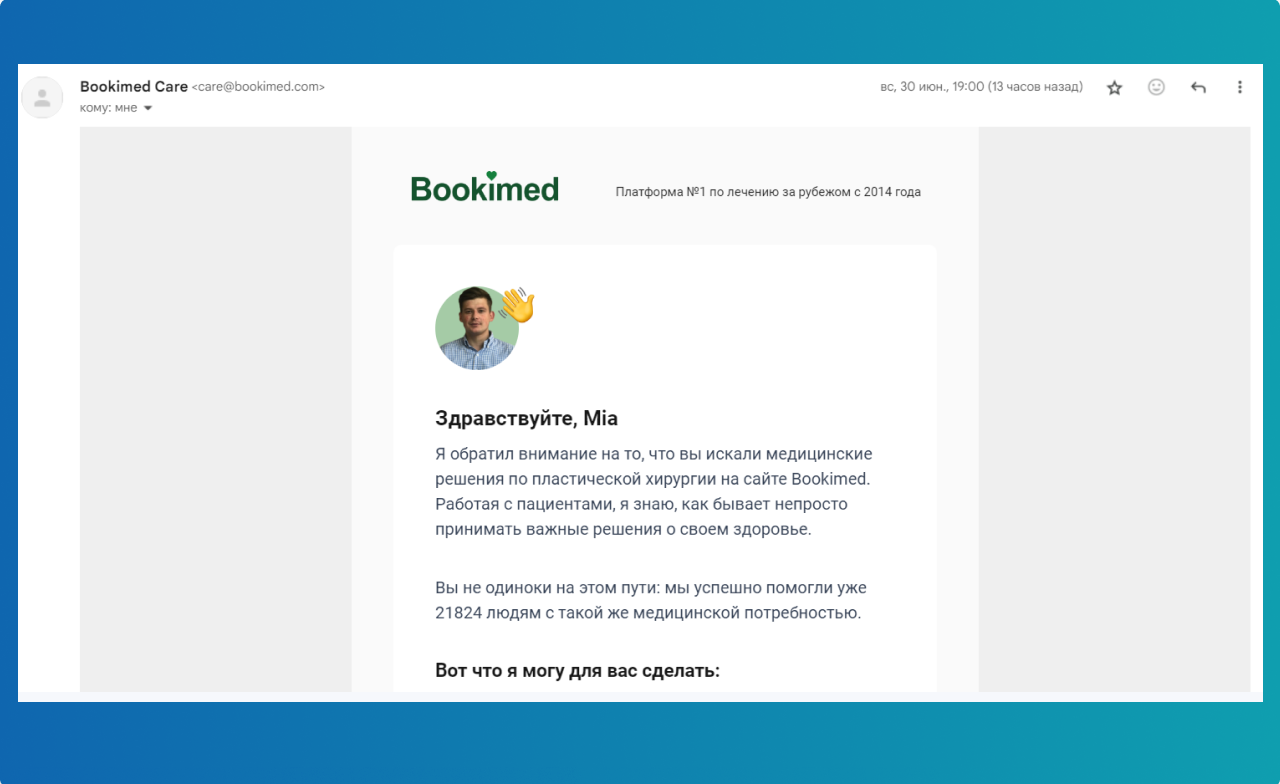
A letter from an overseas clinic selection agency
Social media
Social media plays an important role in promoting medical tourism, particularly among Russian audiences, who are accustomed to relying on expert information from communities and news feeds that align with their interests.
The following strategies are key to success:
-
Content marketing, including the publication of useful posts and videos about procedures, as well as interviews with doctors.
-
Paid social will be most effective on platforms where comprehensive promotional posts are permitted;
-
Active interaction with subscribers in communities is recommended, including answering questions and providing prompt feedback.
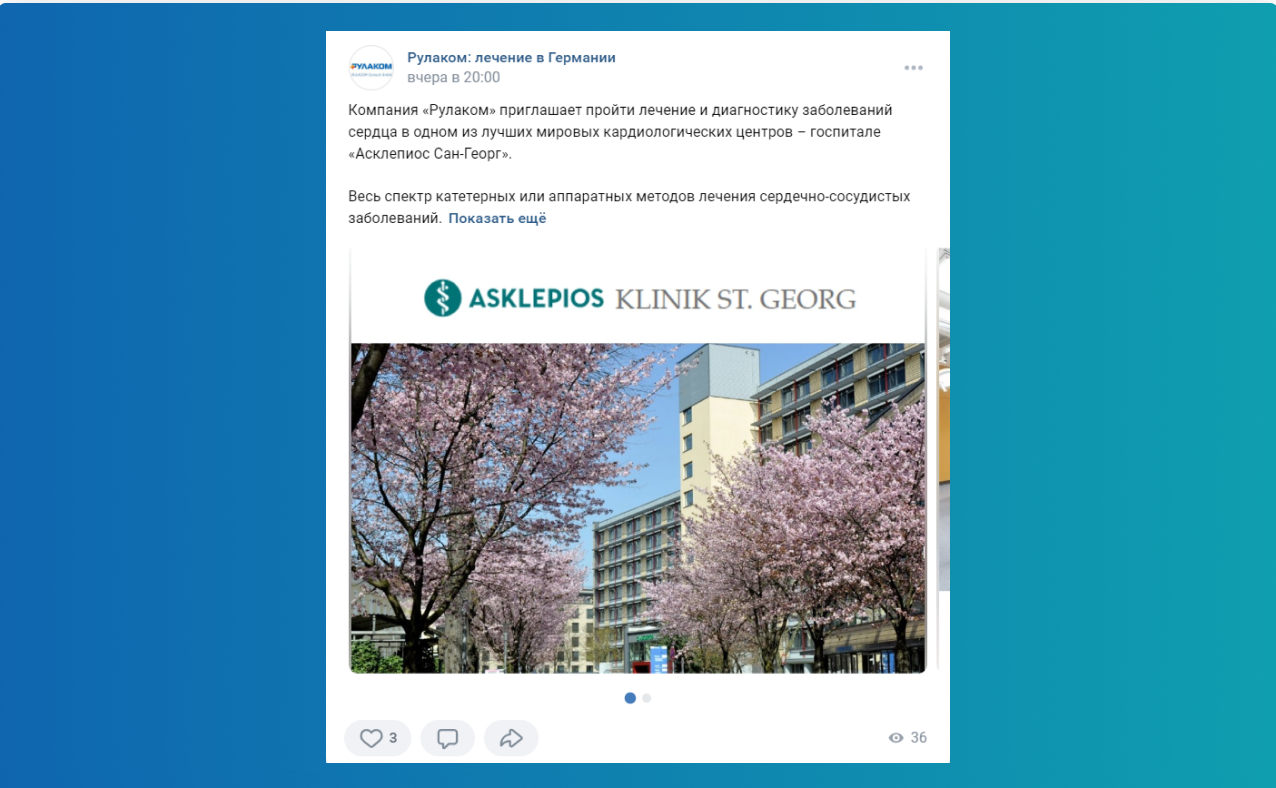
Rulacom company’s publication in the VKontakte community
The most popular platforms in Russia today are VKontakte, Telegram, Odnoklassniki, YouTube, Dzen, and Instagram*. To promote medical services, each of these platforms can be effective if the appropriate format is selected. However, the most relevant audience by age tends to spend a significant amount of time on Odnoklassniki, Dzen, and VKontakte, while the most affluent audience spends the majority of their time on Telegram and YouTube. By leveraging the unique features of these resources, it is possible to reach a vast audience of individuals interested in pursuing treatment abroad.
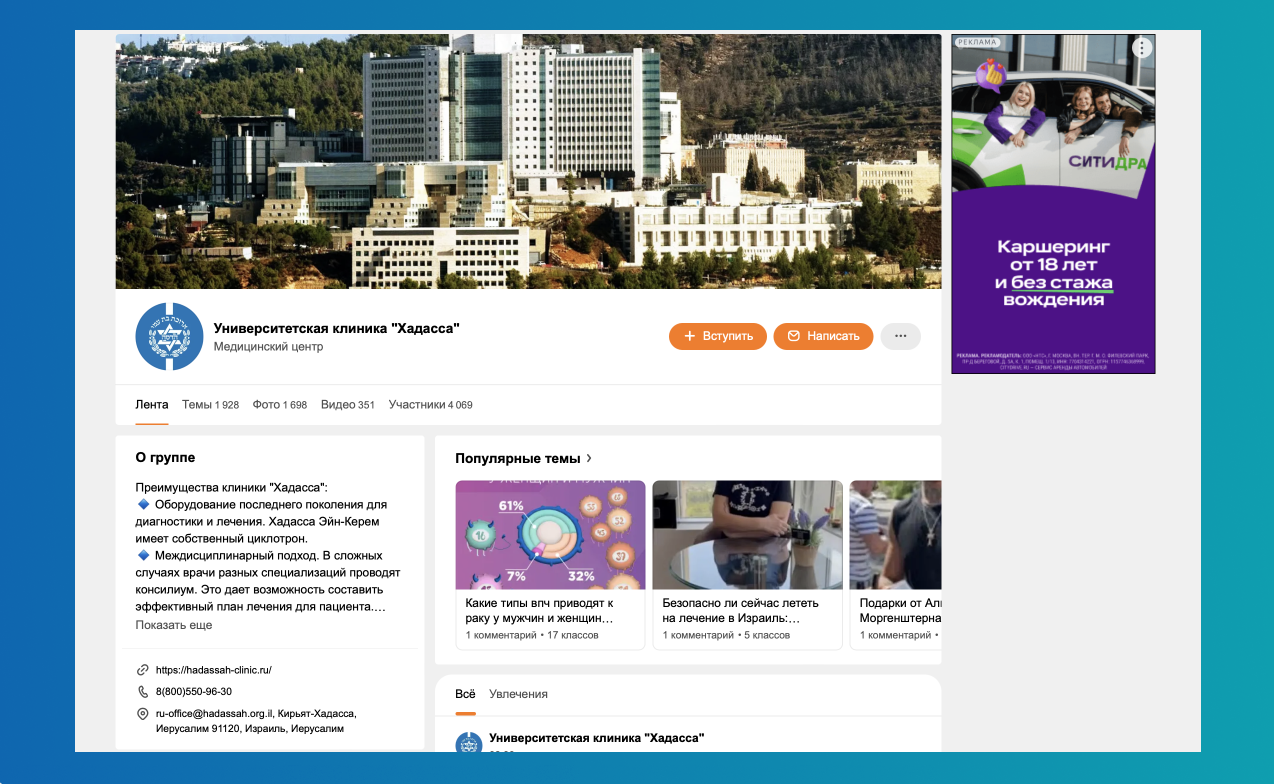
Russian-language page of Hadassah Clinic (Israel) in Odnoklassniki
Influencer Marketing
Influencer marketing is a strategy that promotes services to subscribers of popular social media pages. In the context of medical tourism, these can be media personalities and bloggers with a focus on healthy lifestyles, fitness, beauty, and travel. As an illustration, reviews of sanatoriums are currently a popular feature on Instagram*. This is beginning to capture the interest of generations Y and Z, defined as individuals born between 1984 and 2015. Furthermore, there is a growing demand for the promotion of cosmetic services and plastic surgery.
Review of the day at the sanatorium in the Instagram* profile by blogger notmodel
The primary benefit of this strategy is the high level of audience trust in the influencer's opinion, which allows for the cost of advertising to be effectively managed. In the context of the Russian market, this approach can be particularly effective, given the limitations on traditional forms of advertising and the rapid evolution of consumer preferences. The influence of bloggers and opinion leaders on audiences is on the rise, and they frequently serve as pivotal intermediaries between medical clinics and prospective patients.
Russia has significant potential for growth in medical tourism, but for successful promotion, an integrated approach is essential. The RMAA agency has considerable expertise in this field and is well-placed to advise clients on the most appropriate strategies and to develop fully integrated advertising campaigns. To contact our manager, please complete the application form in the Contacts section.
*Meta Platforms Inc. project, the activities of which are banned in Russia.
How does the Media Buying Market in Russia Work?
Navigating the Media Buying System in Russia
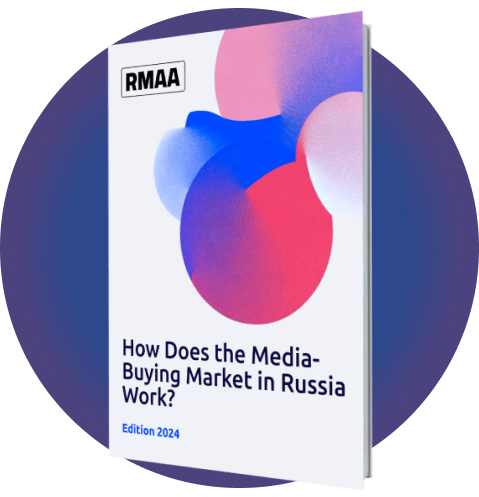
Ready to partner with the specialists in Russian marketing and advertising?
About the Author
Digital Strategist. Head of one of the project groups at RMAA. Maria started her journey in digital marketing in 2009.
Join 2,000+ of your Peers!
Get our latest articles delivered to your email inbox and get our exclusive White Paper "Digital Marketing in Russia. Finding your customers on the internet" for FREE!
You will be the first to know about Russian marketing insights,
news and updates from our agency.
Stay tuned!
We're updating our website's design step by step, so some pages may look different. Thank you for your understanding.
Got it














